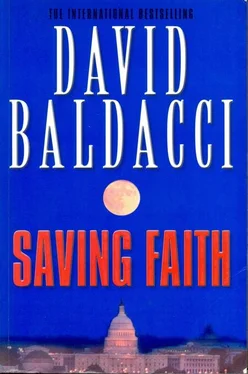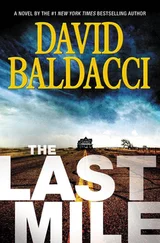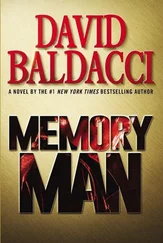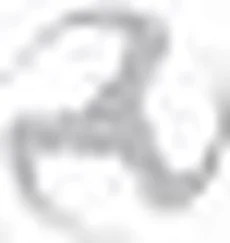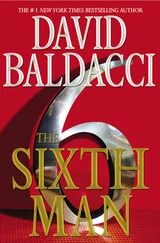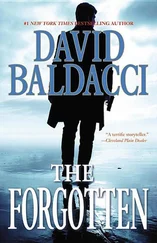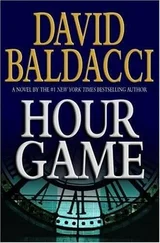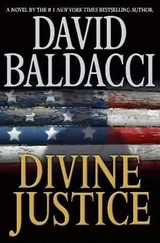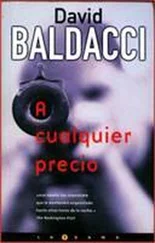David Baldacci - Saving Faith
Здесь есть возможность читать онлайн «David Baldacci - Saving Faith» весь текст электронной книги совершенно бесплатно (целиком полную версию без сокращений). В некоторых случаях можно слушать аудио, скачать через торрент в формате fb2 и присутствует краткое содержание. Жанр: Политический детектив, на английском языке. Описание произведения, (предисловие) а так же отзывы посетителей доступны на портале библиотеки ЛибКат.
- Название:Saving Faith
- Автор:
- Жанр:
- Год:неизвестен
- ISBN:нет данных
- Рейтинг книги:4 / 5. Голосов: 1
-
Избранное:Добавить в избранное
- Отзывы:
-
Ваша оценка:
- 80
- 1
- 2
- 3
- 4
- 5
Saving Faith: краткое содержание, описание и аннотация
Предлагаем к чтению аннотацию, описание, краткое содержание или предисловие (зависит от того, что написал сам автор книги «Saving Faith»). Если вы не нашли необходимую информацию о книге — напишите в комментариях, мы постараемся отыскать её.
Saving Faith — читать онлайн бесплатно полную книгу (весь текст) целиком
Ниже представлен текст книги, разбитый по страницам. Система сохранения места последней прочитанной страницы, позволяет с удобством читать онлайн бесплатно книгу «Saving Faith», без необходимости каждый раз заново искать на чём Вы остановились. Поставьте закладку, и сможете в любой момент перейти на страницу, на которой закончили чтение.
Интервал:
Закладка:
Saving Faith
David Baldacci
First published in the US by Warner Books, 1999 First published in Great Britain by Simon Schuster UK Ltd, 1999 A Viacom company
Copyright © 1999 by Columbus Rose, Ltd
The right of David Baldacci to be identified as author of this work has been asserted by him in accordance with sections 77 and 78 of the Copyright, Designs and Patents Act, 1988.
13579108642
Simon Schuster UK Ltd Africa House 64-78 Kingsway London WC2B 6AH
Simon Schuster Australia Sydney
A CIP catalogue record for this book is available from the British Library
ISBN 0-684-86165-8 TPB ISBN 0-684-86164-X HB
Printed and bound in Great Britain by Butler Tanner Ltd, Frome and London
* * *
This book is a work of fiction. Names, characters, places and incidents are either a product of the author's imagination or are used fictitiously. Any resemblance to actual people living or dead, events or locales is entirely coincidental.
* * *
To Aaron Priest, my friend
CHAPTER 1
The somber group of men sat in a large room that rested far belowground, accessed by only a single, high-speed elevator. The chamber had been secretly built during the early 1960s under the guise of renovating the private building that squatted over it. The original plan, of course, was to use this "super-bunker" as a refuge during a nuclear attack. This facility was not for the top leaders of American government; it was for those whose level of relative "unimportance" dictated that they probably wouldn't be able to get out in time but who still rated protection afforded no ordinary citizen. Politically, even in the context of total destruction, there must be order.
The bunker was built at a time when people believed it possible to survive a direct nuclear hit by burrowing into the earth inside a steel cocoon. After the holocaust that would annihilate the rest of the country, leaders would emerge from the rubble with absolutely nothing left to lead, unless you counted vapor.
The original, aboveground building had been leveled long ago, but the subterranean room remained under what was now a small strip mall that had been vacant for years. Forgotten by virtually all, the chamber was now used as a meeting place for certain people in the country's primary intelligence-gathering agency. There was some risk involved, since the meetings were not related to the men's official duties. The matters discussed at these gatherings were illegal, and tonight even murderous. Thus additional precautions had been necessary.
The super-thick steel walls had been supplemented by a copper coating. That measure, along with tons of dirt overhead, protected against prying electronic ears lurking in space and elsewhere. These men didn't particularly like coming to this underground room. It was inconvenient, and ironically, it seemed far too James Bondish even for their admittedly cloak-and-dagger tastes. However, the truth was the earth was now encircled with so much advanced surveillance technology that virtually no conversation taking place on its surface was safe from interception. One had to dig into the dirt to escape his enemies. And if there was a place where people could meet with reasonable confidence that their conversations would not be overheard even in their world of ultrasophisticated peekaboo, this was it.
The gray-headed people present at the meeting were all white males, and most were nearing their agency's mandatory retirement age of sixty. Dressed quietly and professionally, they could have been doctors, lawyers or investment bankers. One would probably not remember any of the group a day after seeing them. This anonymity was their stock-in-trade. These sorts of people lived and died, sometimes violently, over such details.
Collectively, this cabal possessed thousands of secrets that could never be known by the general public because the public would certainly condemn the actions giving rise to these secrets. However, America often demanded results—economic, political, social and otherwise—that could be obtained only by smashing certain parts of the world to a bloody pulp. It was the job of these men to figure out how to do so in a clandestine manner that would not reflect poorly on the United States, yet would still keep the country safe from the pesky international terrorists and other foreigners unhappy with the stretch of America's muscle.
The purpose of tonight's gathering was to plot the killing of Faith Lockhart. Technically, the CIA was prohibited by presidential executive order from engaging in assassination. However, these men, though employed by the Agency, were not representing the CIA tonight. This was their private agenda, and there was little disagreement that the woman had to die, and soon; it was critical for the well-being of the country. These men knew this, even if American presidents did not. However, because of another life that was involved, the meeting had become acrimonious, the group resembling a cadre of posturing members fighting on Capitol Hill over billion-dollar slices of pork.
"What you're saying, then," one of the white-haired men said as he poked the smoke-filled air with a slender finger, "is that along with Lockhart we have to kill a federal agent." The man shook his head incredulously. "Why kill one of our own? It can only lead to disaster."
The gentleman at the head of the table nodded thoughtfully. Robert Thornhill was the CIA's most distinguished Cold War soldier, a man whose status at the Agency was unique. His reputation was unassailable, his compilation of professional victories unmatched. As associate deputy director of Operations, he was the Agency's ultimate free safety. The DDO, or deputy director of operations, was responsible for running the field operations that undertook the secret collection of foreign intelligence. The operations directorate of the CIA was also unofficially known as the "spy shop," and the deputy director was still not even publicly identified. It was the perfect place to get meaningful work done.
Thornhill had organized this select group, who were as upset as he about the state of affairs at the CIA. It was he who had remembered that this bloated underground time capsule existed. And it was Thornhill who had found the money to secretly bring the chamber back to working condition and upgrade its facilities. There were thousands of little taxpayer-funded toys like that sprinkled around the country, many of them gone to complete waste. Thornhill suppressed a smile. Well, if governments didn't waste their citizens' hard-earned money, then what would be left for governments to do?
Even now, as he ran his hand over the stainless steel console with its quaint built-in ashtrays, sniffed the filtered air and felt the protective coolness of the earth all around, Thornhill's mind wandered back for a moment to the Cold War period. At least there was a measure of certainty with the hammer and sickle. In truth, Thornhill would take the lumbering Russian bull over the agile sand snake that you never knew was out there until it flung its venom into you. There were many who wanted nothing more in life than to topple the United States. It was his job to ensure that never happened.
Gazing around the table, Thornhill gauged each man's devotion to his country and was satisfied it matched his own. He had wanted to serve America for as long as he could remember. His father had been with the OSS, the World War II-era predecessor to the CIA. He had known little of what his father did at the time, but the man had instilled in his son the philosophy that there was no greater thing to do with one's life than to serve one's country. Thornhill had joined the Agency right out of Yale. Right up until the day he died, his father had been proud of his son. But no prouder than the son had been of the old man.
Читать дальшеИнтервал:
Закладка:
Похожие книги на «Saving Faith»
Представляем Вашему вниманию похожие книги на «Saving Faith» списком для выбора. Мы отобрали схожую по названию и смыслу литературу в надежде предоставить читателям больше вариантов отыскать новые, интересные, ещё непрочитанные произведения.
Обсуждение, отзывы о книге «Saving Faith» и просто собственные мнения читателей. Оставьте ваши комментарии, напишите, что Вы думаете о произведении, его смысле или главных героях. Укажите что конкретно понравилось, а что нет, и почему Вы так считаете.
